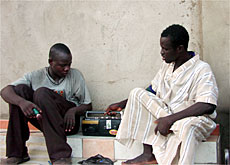The digital divide is a question of content

A World Bank expert tells swissinfo information technology can aid the fight against poverty, although how remains unclear.
Bruno Lanvin, an advisor on e-strategy in Geneva, liaises between the development bank and the World Summit on the Information Society (WSIS).
The second phase of the WSIS takes place in Tunis from November 16-18 with the aim of bridging the digital divide between rich and developing countries.
The digital divide refers to the socio-economic gap between communities that have access to computers and the internet and those that do not.
It also refers to gaps between groups regarding their ability to use ICTs (Information and Communications Technologies) effectively, owing to differing levels of literacy and technical skills, as well as the gap between those groups that have access to useful and good-quality digital content and those that do not.
swissinfo: Has the WSIS already borne fruit?
Bruno Lanvin: In Geneva in 2003, government delegates approved an action plan which listed a series of areas where action on the parts of international organisations, states, civil society and the private sector was desirable.
As for the political declaration adopted during the first conference, it laid down the principles for constructing an open and equal information society.
However, any major gains made by the WSIS require the strong participation of civil society. This is in effect the first time that a summit organised by the United Nations has opened its doors so magnanimously to non-governmental organisations (NGOs).
By playing along and proposing a series of concrete measures, civil society has shown governments that taking them – as well as the private sector – into account is good for the governments.
swissinfo: Is it easier today to see how information technology can help the fight against poverty?
B.L.: The Geneva summit in 2003 showcased hundreds of projects, which showed how certain technologies could help communities to exit poverty and exclusion. But we didn’t have a common vision.
Today we are able to demonstrate to a minister that a dollar invested in ICTs is as useful as one invested in health or education.
But to gauge the benefits, one should not think in terms of addition and subtraction but in terms of multiplication. In other words, ministers should no longer have to ask themselves which budget they should tap for funds to allocate to ICTs.
Having said that, and contrary to the belief fashionable in the 1990s which said ICTs were a global panacea, these technologies remain tools and are not a means in themselves.
swissinfo: Does anyone believe that the economy is the only way of attaining the objectives of the WSIS?
B.L.: It is true that the digital divide is closing thanks to the dynamism of the private sector. That said, the question of the digital divide is not only a question of equipment and infrastructure.
What counts these days is knowing how the poorest of populations could make use of communication tools.
Essential discussions on the emergence of the information society regarding intellectual property, innovation and research are still carried out without the presence of the majority of southern countries.
swissinfo-interview: Frédéric Burnand
According to the Swiss Agency for Development and Cooperation, ICTs can promote development provided:
– they allow access to useful information to those who are the most destitute;
– they give a voice to those who have been excluded;
– they offer knowledge and promote understanding of the different cultures around the world.

In compliance with the JTI standards
More: SWI swissinfo.ch certified by the Journalism Trust Initiative












You can find an overview of ongoing debates with our journalists here . Please join us!
If you want to start a conversation about a topic raised in this article or want to report factual errors, email us at english@swissinfo.ch.